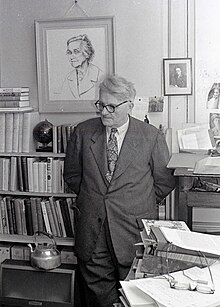Joseph Needham
British biochemist, historian and sinologist (1900–1995)
Noel Joseph Terence Montgomery Needham CH FRS FBA (/ˈniːdəm/; 9 December 1900 – 24 March 1995) was a British biochemist, historian of science and sinologist known for his scientific research and writing on the history of Chinese science and technology, initiating publication of the multivolume Science and Civilisation in China.

He was elected a fellow of the Royal Society in 1941 and a fellow of the British Academy in 1971. In 1992, Queen Elizabeth II conferred on him the Companionship of Honour, and the Royal Society noted he was the only living person to hold these three titles.
Quotes
edit- To seek the ultimate origin or predisposition of the Indian conviction in the profoundly Hindu world view of endless cyclical change, kalpa and mahakalpas succeeding one another in self-sufficient and unwearying round. For Hindus as well as Taoists, the universe itself was a perpetual motion machine.
- Lannoy, Richard. Tfre speaking tree: a study of Indian culture alld society London, New York, Oxford University Press, 1971. p.292As Quoted and attributed in Londhe, S. (2008). /A_Tribute_to_Hinduism.html?id=G3AMAQAAMAAJ A tribute to Hinduism: Thoughts and wisdom spanning continents and time about India and her culture
- It is good to remember, therefore, that our own pious founders were not the only men, and that Christendom was not the only culture, to set on foot great and noble institutions of learning where successive generations of students assembled to get the benefits of education and research. When the men of Alexander the Great came to Taxila in India in the fourth century BC they found a university the like of which had not then been seen in Greece ... and was still existing when the Chinese pilgrim Fa-Hsien went there about AD 400.
- Agarwal, D P Did You know? infmityfoundation.com http:// www.infinityfoundation.comlmandala/t_dy/t_dLQ12.htrn 328As Quoted and attributed in Londhe, S. (2008). A tribute to Hinduism: Thoughts and wisdom spanning continents and time about India and her culture
- Indian culture in all probability excelled in systematic thought about Nature (as for example in the Sarokhya atomic theories of Kshana, bhutadim paramanu, etc.), including also biological speculations ... When the balance comes to be made up, it will be found I believe, that Indian scientific history holds as many brilliant surprises ...
- Alvares, Claude Alphonso Homo faber: technology and culture III IndIG, China, and the Westfi'om 1500 to the present day p. 69 - 70 As Quoted and attributed in Londhe, S. (2008). A tribute to Hinduism: Thoughts and wisdom spanning continents and time about India and her culture
- Joseph Needham, has stated, "Future research on the history of science and technology in Asia will in fact reveal that the achievements of these peoples contribute far more in all pre-Renaissance periods to the development of world science than has yet been realized."
- attributed at [1]
Quotes about Needham
edit- He had a tendency — not entirely justified in the light of more recent research — to think well of Taoism, because he saw it as playing a part that could not be found elsewhere in Chinese civilization. The mainstream school of thinking of the bureaucratic Chinese elite, or 'Confucianism' (another problematic term) in his vocabulary, seemed to him to be less interested in science and technology, and to have 'turned its face away from Nature.' Ironically, the dynasty that apparently turned away from printing from 706 till its demise in 907 was as Taoist as any in Chinese history, though perhaps its 'state Taoism' would have seemed a corrupt and inauthentic business to Needham.[31]
- Barrett, Timothy Hugh (2008), The Woman Who Discovered Printing, Great Britain: Yale University Press, ISBN 978-0-300-12728-7 (alk. paper)
- Cambridge scientist historian Joseph Needham’s loyalty was to Mao’s version of Stalinism as a system, but he got enamoured with China itself and wrote a very Sinocentric history of Science and Civilization in China, highlighting the unexpectedly large contribution which China has made to human progress.
- Elst, Koenraad (1999). Update on the Aryan invasion debate New Delhi: Aditya Prakashan.
- Alas, it was also originally Needham's Marxist and Weberian point of departure. As Needham found more and more evidence about science and technology in China, he struggled to liberate himself from his Eurocentric original sin, which he had inherited directly from Marx, as Cohen also observes. But Needham never quite succeeded, perhaps because his concentration on China prevented him from sufficiently revising his still ethnocentric view of Europe itself.[29]
- Frank, Andre Gunder (1998), ReORIENT, Berkeley and Los Angeles, California: University of California Press, ISBN 9780520214743
- J Needham's (1971) monumental work on Chinese nautics offers by far the most scholarly synthesis on the subjects of Chinese shipbuilding and navigation. His propensity to view the Chinese as the initiators of all things and his constant references to the superiority of Chinese over the rest of the world's techniques does at times detract from his argument.[28]
- Pierre-Yves Manguin: "Trading Ships of the South China Sea. Shipbuilding Techniques and Their Role in the History of the Development of Asian Trade Networks", Journal of the Economic and Social History of the Orient, Vol. 36, No. 3. (1993), pp. 253–280 (268, Fn.26; Robert Finlay, "China, the West, and World History in Joseph Needham's Science and Civilisation in China", Journal of World History 11 (Fall 2000): 265–303.